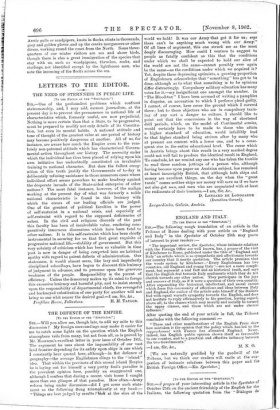LETTERS TO THE EDITOR.
THE NEED OF STERNNESS IN PUBLIC LIFE.
[To THE EDITOR OF THE " SPF.CTATOR.”1
SIR,—One of the profoundest problems which confront statesmanship, and, I may add, earnest journalism, at the present day is to prevent the permanence in national life of characteristics which, formerly useful, are now prejudicial. Nothing is more certain than that a State, to be progressive, must be prepared to modify not only details of its Constitu- tion, but even its mental habits. A national attitude and tone of thought of the greatest value at one period of history may become positively dangerous at another. All of us, for instance, are aware how much the Empire owes to the reso- lutely non-paternal attitude which has characterised Govern- mental action throughout our history. The necessity under which the individual has thus been placed of relying upon his own initiative has undoubtedly constituted an invaluable training to national character. But does the fullest recog- nition of this truth justify the Governments of to-day in deliberately refusing assistance in those numerous cases where individual effort seems powerless to make headway against the desperate inroads of the State-aided enterprise of other nations ? The most fatal instance, however, of the malign working at the present day of what was formerly a noble national characteristic is found in this leniency with which the errors of our leading officials are judged. One of the greatest of political faculties is the power of self-restraint in a national crisis, and especially of self-restraint with regard to the supposed deficiencies of rulers. In the civil and religious discords of the past this faculty has been of incalculable value, rendering com- paratively innocuous dissensions which have been fatal to other nations. It is this self-restraint which has been chiefly instrumental in securing for us that first great requisite of progressive national life,—stability of government. But this very sobriety of criticism which has been so valuable in time past is now in danger of being conyerted into an habitual apathy with regard to patent defects of administration. Our statesmen, it would almost seem, like lazy and imperfectly disciplined schoolboys, have begun to discount this leniency of judgment in advance, and to presume upon the generous weakness of the people. Responsibility is the parent of efficiency. Unless the democracy makes up its mind to forego this excessive leniency and harmful pity, and to insist sternly upon the responsibility of departmental chiefs, the revengeful and hackneyed substitution of one party for another will not bring us one whit nearer the desired goal.—I am, Sir, &c.,










































 Previous page
Previous page